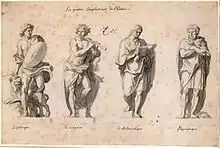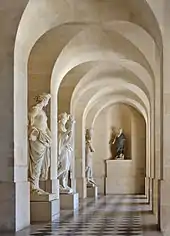The grande commande was a commission ordered by Louis XIV for statues intended to decorate the parterre d’eau of the gardens of the Palace of Versailles, as initially conceived in 1672. The commission, which included 24 statues and four groups,[1] was ordered in 1674. Designed by Charles Le Brun from Cesare Ripa’s Iconologia, the statues were executed by the foremost sculptors of the day (Blunt, 1980; Friedman, 1988, 1993; Nolhac, 1913; Thompson, 2006; Verlet, 1985).
Owing to concerns of the effects of the vertical lines of the statues in relations to the garden façade of the château, the statues of the grande commande were transferred to other locations in the gardens in 1684 (Berger, 1985; Blunt, 1980; Friedman, 1988, 1993; Marie, 1968; Nolhac, 1901, 1913; Thompson, 2006; Verlet, 1985; Weber, 1993).
 Charles Le Brun, The Four Parts of the Day
Charles Le Brun, The Four Parts of the Day Le Brun, The Four Seasons
Le Brun, The Four Seasons Le Brun, The Four Elements
Le Brun, The Four Elements Le Brun, 'The Four Humors of Man
Le Brun, 'The Four Humors of Man Le Brun, 'The Four Forms of Poetry
Le Brun, 'The Four Forms of Poetry
The 24 statues were personifications of the classic quaternities:
|
|
|
|
|
|
The four groupings represented the four classic Abductions:
- The Four Abductions:


| “Meoncholy” by Michel de la Perdrix, (? - 1693) | “Phlegmatic” by Matthieu Lespagnandelle, (1617–1689) | “Choloric” by Jacques Houzeau, (1624–1691) | “Sanguine” by Noël V Jouvenet, (?-1716) |
| “Dawn” by Pierre I Legros, (1629–1714) | “Noon” by Gaspard Marsy, (1624–1681) | “Evening” by Martin Desjardins, (1637–1694) | “Night” by Jean Raon, (1631–1707) |
| “Europe” by Pierre Mazeline, (1632–1708) | “Africa” by Jean Cornu, (1650–1710) | “Asia” by Léonard Roger, (1644-après 1694) | “America” by Gilles Guérin, (1611/1612-1678) |
| “Lyric Poetry” by Jean-Baptiste Tuby, (1635–1700) | “Pastoral Poetry” by Pierre Granier, (1655–1715) | “Satyrical Poetry” by Philippe de Buyster, (1595–1688) | “Epic Poetry” by Jean Drouilly, (1641–1698) |
| “Spring” by Laurent Magnier, (1618–1700) | “Summer” by Pierre Hutinot, (1616–1679) | “Autumn” by Thomas Regnaudin, (1622–1706) | “Winter” by François Girardon, (1628–1715) |
| “Fire” by Nicolas Dossier, (1629–1700) | “Air” by Etienne Le Hongre, (1628–1690) | “Earth” by Benoît Massou, (1627–1684) | “Water” by Pierre I Legros, (1629–1714) |
| “Boreas abducting Orethyia” by Anselme I Flamen, (1647–1717) | “Saturn abducting Cybele” by Thomas Regnaudin, (1622–1706) | “Pluto abducting Persephone” by François Girardon, (1628–1715) |
Sources
|
Books
Journals
|
|
References
- ↑ All but the "Abduction of Coronis by Neptune" were completed.